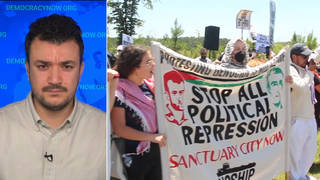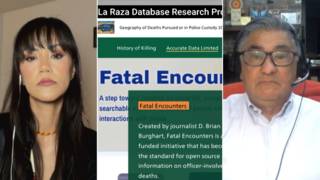
Guests
Anti-Asian hate crimes have spiked across the U.S. over the past year, fueled in part by Donald Trump’s racist rhetoric about the coronavirus. One recent study found a 150% increase in hate crimes targeting Asian Americans in 2020, even though overall hate crimes fell last year. Ron Kim, member of the New York State Assembly representing the 40th District in Queens, New York, says anti-Asian sentiment tends to flare up during times of crisis. “There’s a long history of Asian Americans in this country feeling targeted and scapegoated whenever we experience economic downturns,” says Kim. We also speak with Kim Tran, an antiracist writer and organizer based in the Bay Area, who says anti-Asian violence is “diffuse,” affecting people in different ethnic and cultural communities in various ways, “but there is a common sense of racial scapegoating.”
Transcript
AMY GOODMAN: It’s been a devastating year for Asian Americans as hate crimes spiked across the country, fueled by Donald Trump’s racist rhetoric about the coronavirus. One recent study found a 150% increase in anti-Asian American hate crimes in 2020, even though overall hate crimes fell last year.
Here in New York, police investigated 28 hate crimes in 2020 targeting Asian Americans — a ninefold increase over the previous year. On Saturday, the Asian American community, allies and elected officials rallied in New York City to call for action. This is New York Democratic Congressmember Grace Meng.
REP. GRACE MENG: We’ve been taught our entire life to just fit in, just be quiet, don’t speak up, be invisible. If you are invisible enough, you will be seen as American. But we are here to say that we will be invisible no more.
CROWD: No more!
REP. GRACE MENG: We will speak up.
CROWD: Speak up!
AMY GOODMAN: The rally came after at least two more attacks against Asian Americans were reported in New York. Last week, a 36-year-old Asian man was stabbed while walking down the street. And 61-year-old Filipino American Noel Quintana was slashed across the face while on the subway. He also spoke at this weekend’s rally.
NOEL QUINTANA: When the train stopped at Bedford, a man came and stood beside me. So, after a few minutes, he kicked my bag. And when I looked at him, I moved away from him, so that if my bag touches him or disturb him in any way, it’s no longer that case. So, a few more minutes, he kick again my bag. And that’s the time when I move inside the train and told him, “What’s wrong with you?” And that was also the time where the train stopped on the next station and opened the door. And before he left, he moved forward toward me and slashed my face. I thought I was punched on the face, but when I saw the box cutter holding — holding on his hand and the reaction of other people in the train, I knew I was slashed. And I called for help, but nobody came for help.
AMY GOODMAN: Sixty-one-year-old Filipino American Noel Quintana, speaking at a rally Saturday.
One of New York’s most popular Chinese noodle shops, Xi’an Famous Foods, has begun closing early, after two of its employees were attacked in recent months. The company’s CEO, Jason Wang, spoke to NBC4 in New York.
JASON WANG: My employees were attacked, but, you know, in separate incidents. Both, I believe, are to be racially motivated hate crimes. And, you know, while keeping their identities anonymous, but at the same time shedding light to this, I’m hoping that this will paint the picture of what is actually going on.
AMY GOODMAN: We’re joined now by two guests. Ron Kim is a member of the New York State Assembly representing a district that includes Flushing, Queens, which is home to more than 30,000 Chinese immigrants. And joining us from Oakland, California, is Kim Tran, an antiracist writer and organizer based in the Bay Area, currently writing a book titled The End of Allyship: A New Era of Solidarity.
We welcome you both to Democracy Now! Assemblyman Kim, let’s begin with you, here in New York. Can you talk about this increase in Asian American hate crimes?
ASSEMBLYMEMBER RON KIM: Thank you, Amy, for having me on.
There’s a long history of Asian Americans in this country feeling targeted and scapegoated whenever we experience economic downturns or racial injustice, from Vincent Chin, almost 40 years ago, who was murdered because workers lost their jobs to Japanese car manufacturers, took out their anger on him, to the L.A. riots, when Black and Korean communities were pitted against each other.
I think the knee-jerk reaction is to focus on punishing the crime. I get that. It’s heartbreaking, and it makes people feel so angry when we see videos, Asian older adults violently attacked. The 20-year-old in me would have gone out with a bat if I witnessed such a crime. When you feel like your people violently are targeted, the immediate reaction is to respond with more violence, either direct violence or through state-sanctioned violence. This means more policing, more punitive measures. This reaction, Amy, just to be clear, but only solves the symptoms, but do not address the underlying cause of the disease.
JUAN GONZÁLEZ: And, Assemblyman Kim, I’m wondering your sense of the impact, for instance, over the past few years, of the remarks by former President Trump talking about the coronavirus as the “Chinese flu” and constantly raising issues of China as an adversary of the United States. I’m wondering to what degree you think these words from the top leader, or former leader, of the United States has had an impact on public consciousness.
ASSEMBLYMEMBER RON KIM: Of course it had a tremendous native impact, you know, but there — we could respond in three different ways to the current situation: We could point to Donald Trump for fueling attacks on Asians by his “Chinese virus” rhetoric, we could increase policing presence, or we could fix the underlying issues of crime and systemic racism that has pitted people of color against each other. There are plenty of politicians with the first and second reactions, but not enough with the third. I think the third reaction requires much more difficult work. It requires investing in people, ending tax breaks for the ultrarich to recirculate wealth into our marginalized communities, and holding politicians accountable so people’s basic needs are met — housing, education and healthcare.
JUAN GONZÁLEZ: I’d like to bring Kim Tran into the conversation, as well. If you could talk about the situation in the Bay Area and also this issue of the systemic historical nature of anti-Asian sentiment in United States? I think back, for instance, to the almost forgotten Rock Springs massacre of 1885 in Wyoming, the anti-Chinese Exclusion Act of 1882. Could you talk about some of that historical legacy that we still face?
KIM TRAN: Absolutely. So, when we see anti-Asian violence in the United States in 2020, it’s the byproduct of a much longer history of anti-Asian policy and anti-Asian sentiment that stems, as you said, all the way back to 1882 with Chinese people being the first nationally barred country from entry into the United States. That being said, we can see glimpses of that same sentiment from the 1871 massacre of Chinese people here in California, all the way up until the post-9/11 Islamophobic violence in South Asian communities. So, anti-Asian violence in America is diffuse. It happens in a lot of different ethnicities and for a lot of different Asian groups. But there is a common sense of racial scapegoating.
That being said, there is phenomenal work being done by grassroots organizations and activists here in Oakland, California. So, just like Assemblyman Kim said, we need to put our communities first. We need to put resources for our communities first. And here in Oakland, what that looks like is a Chinatown accompaniment program, an Ambassador Program, where folks are accompanying our Asian elders and our Asian seniors through Chinatown safely. It’s this really beautiful idea that you can turn to your neighbor and turn to someone that you know to keep you safe. We’re also doing work around making sure that we can turn to someone other than police for these safety measures. So, Anti Police-Terror Project here in Oakland is launching its own mobile mental health crisis unit, so that we can really rely on each other as opposed to something like police, which can increase violence in communities of color.
AMY GOODMAN: Can you talk about the response, Kim Tran, of the violent attacks on — you have Vichar Ratanapakdee, who was well known in his San Francisco neighborhood for his hour-long walks. He had just gotten the vaccine. He was 84 years old, a Thai immigrant. And then you have the 91-year-old man who was shoved to the ground in Oakland, California’s Chinatown and ultimately died. The horror of these, and how people have rallied around, both the Asian American community and the larger community?
KIM TRAN: Yeah. Thank you so much for that question, Amy, because I think whenever you see viral footage of an attack, especially when it’s racially motivated, we start seeing movements happen, right? And we saw that all the way back to Rodney King. We saw it again with Alton Sterling and the Black Lives Matter movement.
And what we’re seeing now is a spotlight on the precarity of being an Asian American person in America. So, when we see these really viral images of folks in California, folks in New York, who are incredibly vulnerable — and I want us to keep in mind that these attacks actually happened around a time of celebration for a lot of Asian American communities. These were around Lunar New Year. So, it was kind of a gut punch — right? — of having these videos start circulating in social media. And we started seeing things like Asian Pacific Environmental Network, APIENC out here in Oakland, California, start creating safety nets because we were seeing these attacks over and over again on Facebook, on Twitter.
JUAN GONZÁLEZ: Yeah, I’d like to ask Assemblyman Kim: Could you talk about — what’s your sense of the response of the New York Police Department to this rash of incidents in New York City? Do you feel the department is properly equipped to be able to handle and identify these kinds of incidents?
ASSEMBLYMEMBER RON KIM: Listen, I think we all want to know that when we call 911, that police will show up and protect us. But to hand over everything, in terms of addressing the systemic reasons for the violence and hatred, to the police is not the solution. That requires much more resources and accountability from elected officials. It’s easy to individualize the hatred, to point fingers at the young Black and Brown teenager who are attacking the Asian older adults, and call it a day. It’s much harder to go back and improve the social conditions that’s brewing the violence. You know, if you just allow thee police to handle everything, that is a copout by politicians saying, “We can’t address this systemically, so we’re just going to take punitive measures and rely on state-backed violence to check the communities who are attacking Asian Americans.” And that’s not good enough.
AMY GOODMAN: I want to go to Connie Wun, co-founder of Asian [American] and Pacific Islander Women Lead, speaking at a protest last month.
CONNIE WUN: What about that violence of living in poverty under a system that doesn’t seem to care about our people? That’s the violence we need to answer to. The vigilantes coming out here calling for more police, I need you to answer to that violence. I want you to represent for that. Our communities are also suffering deportation. Answer to that violence! Our people are in detention centers for indefinite amount of times. I need you there for that, too. And then, you’re not even accounting for the gender violence that our women are experiencing. I need you to account for that.
AMY GOODMAN: That’s Connie Wun in Oakland, California. Kim Tran, your final response? And also, do you see an issue of foreign policy — I hate to say the word — “bleeding” into this, but the vilification of China, not only around coronavirus, but in a lot of ways?
KIM TRAN: Yeah. We’ve seen a lot of racial scapegoating at the domestic, absolutely, but also the international level, right? The dehumanization and the kind of geopolitical pitting of China against the United States has tremendous repercussions for what we experience socially on the ground. And it also serves as a means of us not talking about those realities that, as Connie Wun from AAPI Women Lead is talking about, the reality that 30% of people in Chinatown live under the poverty line. I, as a Vietnamese woman, have the same pay gap as a Black woman. And so, we’re creating certain narratives that make this kind of violence acceptable. And we’re creating these certain kinds of ways of substantiating and perpetuating this violence.
AMY GOODMAN: Well, I want to thank you both for being with us. Kim Tran, we look forward to reading your book. Kim Tran is an organizer in Oakland, California, currently writing a book called The End of Allyship: A New Era of Solidarity. And, Ron Kim, we’d like to ask you to stay with us to address another issue, and that is the future of Governor Andrew Cuomo here in New York. You have a lot to say about a phone call he made to you, when you said he threatened you with “destroying” you. This is around a couple of issues here. We’re talking about sexual harassment and also not telling the truth about thousands of COVID-19 deaths in nursing homes. Stay with us.
[break]
AMY GOODMAN: “The Oppressed Song” by Bunny Wailer, the co-founder of the legendary reggae band The Wailers. He died Tuesday at the age of 73.












Media Options